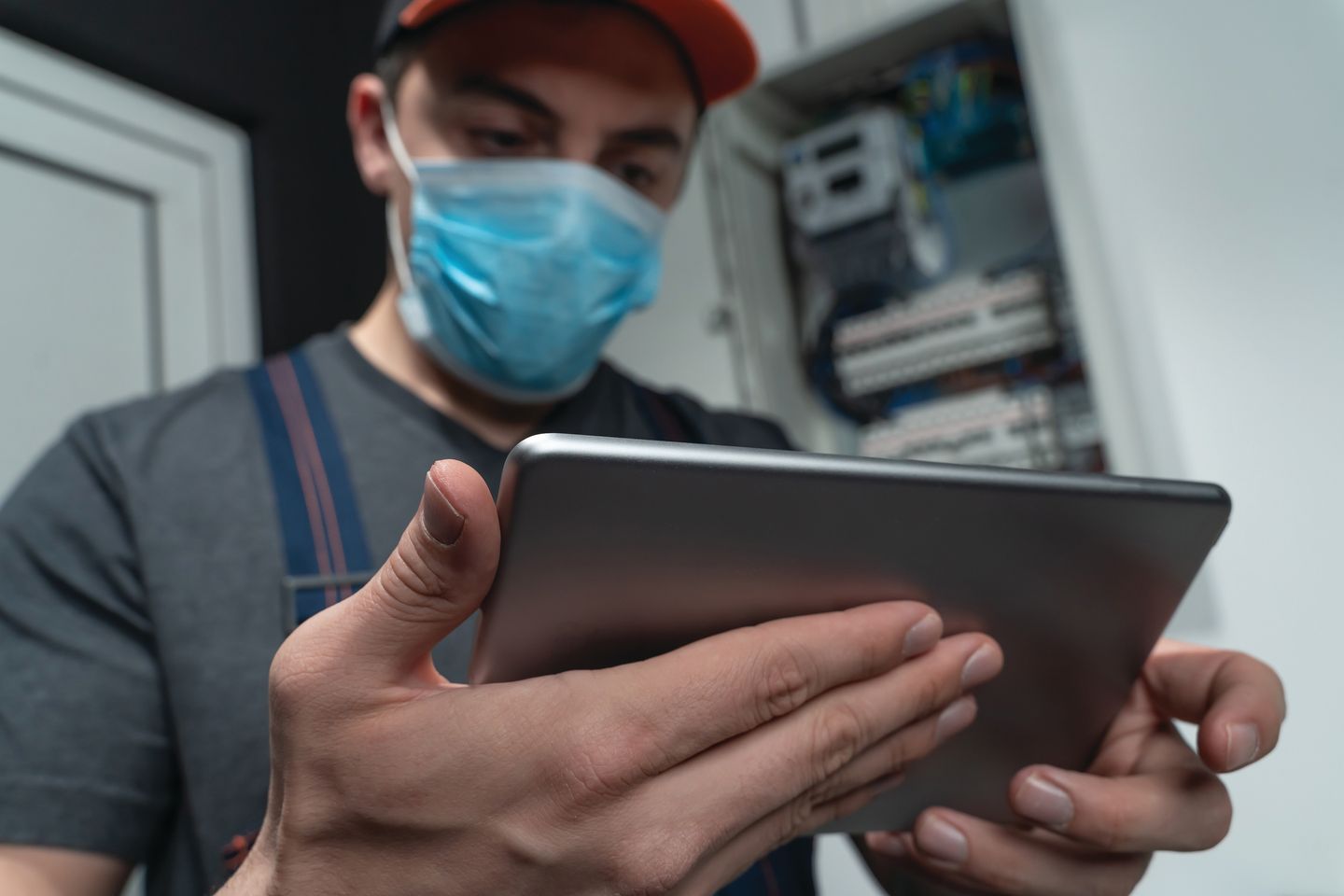IMARK Electrical Now: What is the biggest lesson your team learned during the COVID-19 crisis?
Tony Buonocore, United Electric Supply (New Castle, Delaware): Like many distributors, our marketing team worked remotely and communication within the team was challenging early on. There was a heavy demand on our team for customer communications during this unprecedented time—we had to let our customers know how we were handling the situation and the new procedures we were putting in place. One unexpected challenge was accessing the marketing printer at our headquarters location, which we use to produce signage for our counters. We ultimately formulated a plan where our marketing coordinator would come in, print the signage and loop the signage to the appropriate branches while having zero contact with any of the essential workers at headquarters. It was difficult, but we got it done.
Erica Gallagher, ParamontEO (Woodridge, Illinois): Our biggest challenge has been the overnight shift from (primarily) face-to-face customer engagement to (mainly) virtual interaction. This necessary shift prompted us to build a much more robust digital marketing strategy—one that included a complete website overhaul (currently in-progress), cross-posting, contests and giveaways, content calendars and e-blasts. Aligning messaging across all social media platforms and digitally embedding tools like sell sheets as trackable downloads on our website have enabled us to achieve greater efficiency and optimize reach. We've also put a lot of thought into our content and tone during the pandemic to ensure the right balance between empathy and positivity, acknowledging that it's not really "business as usual" but also confidently conveying our ability to deliver regardless. We want our customers to know how we are adapting as well as provide complete transparency around products that have been impacted by the health crisis; our customers have communicated their appreciation for this approach during this uncertain time.
Shaker Brock, Electric Supply Inc. (Tampa, Florida): Having no events or face-to-face meetings has been the toughest challenge by far. As a result of COVID-19, we've restricted suppliers and customers from entering our building and have cancelled or refrained from scheduling all of our normal annual events such as counter days, tool days, trade shows and customer gatherings involving golf, fishing, clay shooting, etc. Obviously, this has made it very difficult to demo products and push promotions. We've started using Microsoft Teams and have ordered web cameras for many of our team members, but currently they're on backorder due to the large number of people home-schooling and working from home during this pandemic. Teams will help us tremendously with our marketing and sales efforts and we see this becoming the norm. With customers not entering the building, our sales of tools and other point-of-sale purchases have dropped significantly; we set up our will-call area in the parking lot, but we struggle with taking tool displays outside.
Andrew Kunz, Colonial Electric Supply (King of Prussia, Pennsylvania): Once the reality of the pandemic fully sank in, we suddenly found ourselves in long-distance relationships with our customers. Just like everyone else, our world was turned upside down, forcing us to pivot our strategy on how to maintain personal contact with customers in a new contactless world. This challenge was further underscored in Pennsylvania, where commercial construction wasn't considered an essential business for much of March and April. With all commercial construction temporarily on pause, we knew that our normally extremely busy contractors suddenly had a lot of downtime. We needed to adapt quickly and find new ways to engage them with valuable content. We accomplished this by partnering with our strategic suppliers and developing custom weekly web trainings that focused on educating both our sales staff and their customers.
Jeff Lampe, Crescent Electric Supply (East Dubuque, Illinois): With the exponential increase in the number of customers wanting to connect and communicate via digital mediums and social media during the crisis, our challenge has been to simultaneously accelerate the amount of engaging content and the frequency of updates on our COVID policies and procedures so that customers know we stand ready to support them each step of the way. For example, our marketing team has been leveraging short-burst videos (usually one minute or less) that are produced in-house on a regular basis to keep customers informed about such key services as no-signature deliveries, curb-side contactless pick-up and recent enhancements to our e-commerce platform.

"[The pandemic] validated that we were deemed essential and reminded us of the importance of communication and the true value of the services we provide as electrical distributors."
Erica Gallagher, chief technology officer/chief marketing officer, ParamontEO
IMARK Electrical Now: Please share examples of new customer behaviors or demands arising from the crisis as well as an adjustment your company has made that may evolve into a standard sales/service offering.
Gallagher: Several adjustments arose out of our need to limit contact and ensure the health and safety of our employees and customers. Given our active counter business, especially at our Chicago branch, it was important to quickly facilitate call-ahead orders with curbside pick-up to protect our clients and our counter staff. We marketed this new offering across every platform to make sure our customers knew of the new ordering option. This has proven extremely popular, so we plan to continue the service indefinitely. In addition, drivers are able to capture names and photos of receiving parties at delivery to avoid having to obtain signatures on their mobile devices; trucks are also stocked daily with disinfecting products and sanitized at the start and end of every shift, and all drivers are equipped with gloves and masks as well as encouraged to bring a change of clothes to put on before going home to their families at the end of each day. While this may not seem directly related to marketing, our drivers are the face of our business and we hope the public sees that we are taking proactive measures to protect them just as much as we are our customers. Lastly, we stock and sell more personal protective equipment (PPE) and promote hands-free products such as sensor-enabled and voice-activated controls as well as convenience items like contactless door openers, hand sanitizer and more. We'll continue to engage with our customers to identify products and services we can offer to ensure the safety and protection of our clients on the job and continue to drive awareness around our service offerings (such as kitting, cable solutions and pre-fab) that allow for fewer workers on a jobsite to minimize the overall risk of exposure.
Brock: Many customers are not allowing access to their buildings or jobsites and masks are mandatory. We're calling customers when we arrive and they're sending one person out to meet our truck. Signing for orders has also been a challenge, so in some cases we're taking photos of our customers instead of a signature.
Buonocore: The limited contact through the pandemic prevented us from visiting our customers' offices or jobsites. What surprised me is that our sales managers expect that this could continue beyond the pandemic; they've heard from at least some customers that by avoiding in-person contact, they're saving time and gaining efficiency. We've also seen more customers purchasing complete bills of material from a single vendor to limit their exposure. We have responded to this trend by developing a no-contact delivery service that delivers material to the jobsite before it opens. Along with avoiding contact, this service also adds convenience, as the workers can begin as soon as they arrive to the jobsite and aren't waiting on the morning delivery truck. Delivering during low-traffic times boosts efficiency, makes city deliveries much easier and gets more production out of our existing fleet through these extended hours, so this new practice has been beneficial to us as well. I expect that this delivery service will continue to grow post-pandemic.
Lampe: The desire for contactless engagement is an obvious customer behavior that's arisen during the crisis. Due to our customers' heightened concerns for the health, safety and security of their employees, we've seen a growing level of interest in Crescent's StockNOW on-site inventory management programs. As our customers look to keep team members stationed at their jobsites versus sending them out to pick up product, our StockNOW implementation with automatic inventory replenishment has helped them to reduce in-and-out traffic for supplies. These programs also save customers and their purchasing teams time and money by giving them instant access to the products they need through a user-friendly inventory management app on an iPhone or iPad.
Kunz: To our pleasant surprise, our new weekly virtual web training was a hit and each week our virtual lobbies were filled with customers and salespeople. The Q&A at the end of each session always had healthy conversations that made the virtual sessions seem a lot more personal and collaborative and were such a success that we're still doing them now even as things slowly return to normal. The cost effectiveness combined with the convenient nature of virtual sessions is appealing to many people and has us rethinking the way we want to engage our customers and sales even in a COVID-free world.

IMARK Electrical Now: What's the biggest lesson that you, your company and/or the electrical distribution industry learned during the COVID-19 crisis?
Brock: Our industry not only needs to embrace e-commerce but also transform digitally as a whole. Relationships are still very important, but when you can't meet face-to-face, electronic meetings, websites and marketing tools are critical and we as an industry just aren't there yet.
Kunz: Having ready-to-go strategies to keep customers and salespeople engaged is critical to getting through difficult situations like the current crisis. With all the technology we have access to today, we can't let an inability to have in-person meetings slow us down. As we move forward and learn more, we will continue to refine our virtual meeting and training strategies as we maintain the personal touch that's so important in our industry.
Lampe: Being nimble and adaptable to our customers' ever-changing needs is a key lesson learned. In addition to servicing our customers' core needs, Crescent has also been expanding its collaboration with key supplier partners to support vital industries in their efforts to ramp back up as states re-open their economies. For example, we're working to provide turnkey lighting and power solutions for temporary outdoor COVID-19 employee screening facilities across multiple vertical markets. As part of that effort, Crescent is also providing our customers with how-to guides for setting up these screening facilities, along with access to our own industry experts who can help create a customized solution to best meet their unique needs.
Buonocore: As a company, we've always resisted allowing people to work remotely, but we've learned that the ability to work that way is necessary from a disaster recovery standpoint. I suspect that down the road it may expand from a utility function to a job perk that we use to enhance our employees' work-life balance to recruit and retain talent.
Gallagher: This was the first time in our history that a public health crisis effectively shut down our economy. We all say that our customers and staff are important, but the proof is in the extent to which we were willing to put their safety and wellbeing ahead of our own and implement protective measures to continue delivering the supplies our essential workers needed, as safely as possible. When people feel valued, they work harder, contribute more ideas and are more open to new approaches. And when businesses harness the creative problem-solving skills of their employees and listen and act on those ideas, they become stronger, more agile and able to overcome seemingly insurmountable challenges. The pandemic gave us all an opportunity to review our priorities, both personal and professional, refocus on the things that matter most and connect with staff and customers in new ways. It provided a chance to evaluate our processes and challenged us to find new, more efficient, safer methods of doing business. It also validated that we were deemed essential and reminded us of the importance of communication and the true value of the services we provide as electrical distributors.
"Once the reality of the pandemic fully sank in, we suddenly found ourselves in long-distance relationships with all of our customers, forcing us to pivot our strategy on how to maintain personal contact with customers in a new contactless world and find new ways to engage them with valuable content"
Andrew Kunz, marketing manager, Colonial Electric Supply
